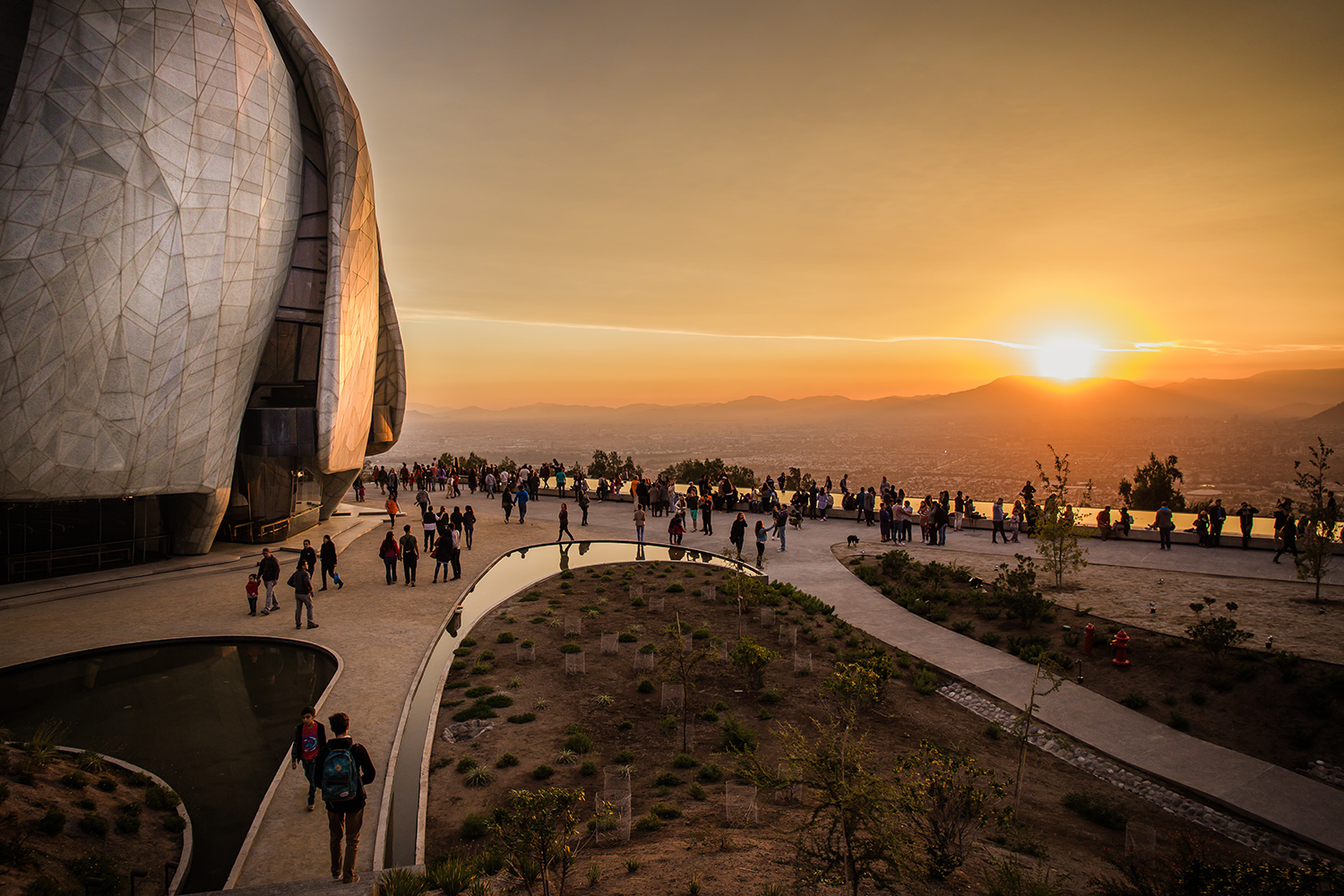In the early period of Baha’u’llah’s revelation, as He was educating the community the Bab had left him to mold, Baha’u’llah began the process of unfolding the spiritual and social teachings of His message with the revelation of a small book of short aphorisms known as the “Hidden Words”. Hailed by Baha’u’llah as the “inner essence” of the revelations of God from the past, the work can be thought of as Baha’u’llah’s Revelation in the form of a seed that would then unfold over the next few decades as a full tree. The Voice of God is the author, who speaks directly to the human heart, in a sublime and intimate manner. Though initially the language and form may seem different, when you ponder upon its meanings, spiritual insights unfold before you. At no time in the history of religion has God spoken to humanity with more intimacy, as a lover speaking to his beloved.
O Son of Man! Veiled in My immemorial being and in the ancient eternity of My essence, I knew My love for thee; therefore I created thee, have engraved on thee Mine image and revealed to thee My beauty.
O Son of Man! I loved thy creation, hence I created thee. Wherefore, do thou love Me, that I may name thy name and fill thy soul with the spirit of life.
‘Abdu’l-Baha’, Baha’u’llah’s son, described divine revelation as the “essential connection that proceeds from the reality of all things”. Within the Hidden Words, Baha’u’llah is revealing to us our true natures, as well as the nature of the world, and the truths that we need to appreciate in order to fully thrive as human beings. As the passages above suggest, humans are not only fundamentally spiritual but have been brought into being to fulfill a fundamentally exalted purpose.
O SON OF SPIRIT! Noble have I created thee, yet thou hast abased thyself. Rise then unto that for which thou wast created.
Again and again, the Voice of God urges us to pull ourselves up out of our limited conceptions- filled with existential doubt about the true purpose of our lives- to see ourselves and the world in its true and glorious dimension.
O FLEETING SHADOW! Pass beyond the baser stages of doubt and rise to the exalted heights of certainty. Open the eye of truth, that thou mayest behold the veilless Beauty and exclaim: Hallowed be the Lord, the most excellent of all creators!
O MOVING FORM OF DUST! I desire communion with thee, but thou wouldst put no trust in Me. The sword of thy rebellion hath felled the tree of thy hope. At all times I am near unto thee, but thou art ever far from Me. Imperishable glory I have chosen for thee, yet boundless shame thou hast chosen for thyself. While there is yet time, return, and lose not thy chance.
The Voice of God even pines away for us, sad that we have not risen to our true destiny, that of being an intimate lover of God.
O SON OF DUST! All that is in heaven and earth I have ordained for thee, except the human heart, which I have made the habitation of My beauty and glory; yet thou didst give My home and dwelling to another than Me; and whenever the manifestation of My holiness sought His own abode, a stranger found He there, and, homeless, hastened unto the sanctuary of the Beloved. Notwithstanding I have concealed thy secret and desired not thy shame.
This idea that we have given our heart to another, when our inmost hearts true desire is to be united with its spiritual Beloved is extraordinarily powerful and beautiful. But who or what have we given our heart to, instead of to God? Baha’u’llah teaches us that it is our “worldly affections”, our attachments to money, wealth, power, and ego, that keep us from finding our true selves and the Beloved within us.
O BEFRIENDED STRANGER! The candle of thine heart is lighted by the hand of My power, quench it not with the contrary winds of self and passion. The healer of all thine ills is remembrance of Me, forget it not. Make My love thy treasure and cherish it even as thy very sight and life.
ALAS! ALAS! O LOVERS OF WORLDLY DESIRE! Even as the swiftness of lightning ye have passed by the Beloved One, and have set your hearts on satanic fancies. Ye bow the knee before your vain imagining, and call it truth. Ye turn your eyes towards the thorn, and name it a flower. Not a pure breath have ye breathed, nor hath the breeze of detachment been wafted from the meadows of your hearts. Ye have cast to the winds the loving counsels of the Beloved and have effaced them utterly from the tablet of your hearts, and even as the beasts of the field, ye move and have your being within the pastures of desire and passion.
There is an extraordinarily profound reality at the root of all this. Baha’u’llah is telling us that this journey we are all on called “life” is really fundamentally a moral and spiritual journey in which the destination is to ultimately find our true Beloved within us. The ramifications of this perspective are so far reaching that it’s impossible to go into all its aspects. Suffice it to say that every difficulty we face in life, and every bounty, is actually truly valuable to the degree that it moves us forward or backward along this spiritual journey.
Take, for instance, the idea of wealth. People go through great efforts to acquire wealth, often making it the object and purpose of nearly every waking moment. But what value does wealth really have, when framed within the reality of the spiritual journey we are all on?
O SON OF MAN! Thou dost wish for gold and I desire thy freedom from it. Thou thinkest thyself rich in its possession, and I recognize thy wealth in thy sanctity therefrom. By My life! This is My knowledge, and that is thy fancy; how can My way accord with thine?
In a later passage, Baha’u’llah will tell us that wealth is only truly valuable to people who have reached spiritual maturity, who see wealth as a means to an end, rather than an end in itself. When complexed with the love of God, wealth can be a wonderful thing as people with spiritual maturity use it to benefit of others.
O MY SERVANT! The best of men are they that earn a livelihood by their calling and spend upon themselves and upon their kindred for the love of God, the Lord of all worlds.
Well is it then with him, who, being rich, is not hindered by his riches from the eternal kingdom, nor deprived by them of imperishable dominion. By the Most Great Name! The splendor of such a wealthy man shall illuminate the dwellers of heaven even as the sun enlightens the people of the earth!
The extremes of wealth and poverty we see in our world are really the expression of a fundamental ignorance about the true value of wealth. Those who hoard it to a degree far beyond their means are really expressing a form of ignorance, as the wealth will ultimately become a major barrier in their own spiritual progress.
O CHILDREN OF DUST! Tell the rich of the midnight sighing of the poor, lest heedlessness lead them into the path of destruction, and deprive them of the Tree of Wealth. To give and to be generous are attributes of Mine; well is it with him that adorneth himself with My virtues.
Note in this passage it’s not that we should “tell the rich of the midnight sighing of the poor” to relieve the plight of the poor, but the wealthy! They are the ones on the “path of destruction” because they are at risk for over-valuing their wealth and not developing their inner resources.
O SON OF MAN! Bestow My wealth upon My poor, that in heaven thou mayest draw from stores of unfading splendor and treasures of imperishable glory. But by My life! To offer up thy soul is a more glorious thing couldst thou but see with Mine eye.
The theme of the reality of our spiritual journey as human beings will course throughout Baha’u’llah’s revelation. People who thirst for power, wealth, and influence will be portrayed as “ignorant”, victims of their own “idle fancies” and “vain imaginings”- ideas that only serve to feed our egos but are out of step with the underlying spiritual truths at the root of all reality. These “veils” have imprisoned them within their own conceptions. Baha’u’llah consistently, throughout the Hidden Words, implores us to listen to His Voice, and put aside those shadowy voices within us that are expressions of ignorance.
O SON OF DUST! Blind thine eyes, that thou mayest behold My beauty; stop thine ears, that thou mayest hearken unto the sweet melody of My voice; empty thyself of all learning, that thou mayest partake of My knowledge; and sanctify thyself from riches, that thou mayest obtain a lasting share from the ocean of My eternal wealth. Blind thine eyes, that is, to all save My beauty; stop thine ears to all save My word; empty thyself of all learning save the knowledge of Me; that with a clear vision, a pure heart and an attentive ear thou mayest enter the court of My holiness.
The Hidden Words also lays the spiritual foundations of many of the social concepts that Baha’u’llah would later reveal in more detail, and ‘Abdu’l-Baha’ would further explain in his writings and talks in the West.
For instance, the second Hidden Word counsels us about justice.
O SON OF SPIRIT! The best beloved of all things in My sight is Justice; turn not away therefrom if thou desirest Me, and neglect it not that I may confide in thee. By its aid thou shalt see with thine own eyes and not through the eyes of others, and shalt know of thine own knowledge and not through the knowledge of thy neighbor. Ponder this in thy heart; how it behooveth thee to be. Verily justice is My gift to thee and the sign of My loving-kindness. Set it then before thine eyes.
Note that Baha’u’llah is not only describing our typical sense of justice, as reflected in our legal system or the “rule of law’, although that sense of justice is undoubtedly part of it, but also about independence of mind and spirit- that we should look at things with our own eyes, know of our own knowledge and not be blind followers of others. That sense of justice, of fair-mindedness, of independent truth seeking, is God’s “best beloved”. ‘Abdu’l-Baha’ would later describe this as the principle of “independent investigation of truth” and he would say that blindly following tradition or one’s impressions without investigation it is at the root of all prejudice, and thus the cause of great and needless division in the world.
The distinctive teaching of Baha’u’llah’s revelation is the oneness of humanity. This will later be described as “the pivot around which all the teachings of Baha’u’llah revolve”. It’s far reaching implications, in our social and political systems, as well as in our daily lives and efforts will be developed more fully in both Baha’u’llah and ‘Abdu’l-Baha’s Writings, as well as later those of Shoghi Effendi, who led the Faith until the Universal House of Justice was elected in 1963.
But even that concept follows from a fundamental spiritual reality expressed in the Hidden Words- that human beings are fundamentally all one.
O CHILDREN OF MEN! Know ye not why We created you all from the same dust? That no one should exalt himself over the other. Ponder at all times in your hearts how ye were created. Since We have created you all from one same substance it is incumbent on you to be even as one soul, to walk with the same feet, eat with the same mouth and dwell in the same land, that from your inmost being, by your deeds and actions, the signs of oneness and the essence of detachment may be made manifest. Such is My counsel to you, O concourse of light! Heed ye this counsel that ye may obtain the fruit of holiness from the tree of wondrous glory.
The concept of the oneness of humanity also flows from the fact that all human beings were created out of love- “I loved thy creation, hence I created thee”. All human beings are therefore loved, intimately and personally loved, by their Creator. Moreover, we have been created for a noble purpose- “Noble have I created thee”. These are foundational ideas about human nature with extended social implications. Because love is a universal reality that extends to all humanity, no limits should be placed on its application- “It is not for him to pride himself who loveth his own country, but rather for him who loveth the whole world. The earth is but one country, and mankind its citizens.” God’s love is the basis of the concept of the oneness of humanity, and our love for God is the energy we can draw upon to actualize a love of all humanity, irrespective of their differences from us in terms of culture and habit.
O SON OF MAN! Deny not My servant should he ask anything from thee, for his face is My face; be then abashed before Me.
Baha’u’llah would found all his social teachings on spiritual roots. In another instance, Baha’u’llah prohibits slavery as being against the law of God and expressed that “It is not for him who is himself a servant to buy another of God’s servants, and this hath been prohibited in His Holy Tablet. Thus, by His mercy, hath the commandment been recorded by the Pen of justice. Let no man exalt himself above another; all are but bondslaves before the Lord, and all exemplify the truth that there is none other God but Him. He, verily, is the All-Wise, Whose wisdom encompasseth all things.”. The prohibition of slavery extended from a spiritual truth at the root of our reality- that we are created from love in a state of servitude to God- to a social and political teaching- that slavery must be abolished.
Unlike the various social thinkers of the 19th century or since, the principles of Baha’u’llah’s revelation all spring from spiritual roots, truths that well-up from the underlying reality of the world. Baha’u’llah taught that that reality, and the reality of our consciousness, is ultimately and fundamentally spiritual, where the greatest commodity to own is virtue and authentic character. Therefore, as much as civil liberties and secular equalities are valuable in their own right, the true and lasting basis of human civilization is the upliftment of human beings to their natural state of nobility and goodness, which will then flow out in many directions in the improvement of our world materially and socially.
As noted above, Baha’u’llah described the Hidden Words as the “inner essence” of the Revelations of the past. It’s worth citing the entire preamble-
This is that which hath descended from the realm of glory, uttered by the tongue of power and might, and revealed unto the Prophets of old. We have taken the inner essence thereof and clothed it in the garment of brevity, as a token of grace unto the righteous, that they may stand faithful unto the Covenant of God, may fulfill in their lives His trust, and in the realm of spirit obtain the gem of divine virtue.
Baha’u’llah’s teaching about religion is that each revelation of God has two aspects- an inner changeless aspect, and an outer form that varies from age to age depending on humanity’s circumstances and maturity. The inner aspect is expressed in the Hidden Words and everyone- of whatever faith- will hear echoes of their own religion within them. These are the changeless principles of God- the foundation of true civilization.
Baha’u’llah will later encourage people of all faiths to look at the inner essence of their religion, abandon the traditions, forms, and structures that have build up over the centuries, and see the law and teachings of God as one Reality.
O contending peoples and kindreds of the earth! Set your faces towards unity, and let the radiance of its light shine upon you. Gather ye together, and for the sake of God resolve to root out whatever is the source of contention amongst you. ..There can be no doubt whatever that the peoples of the world, of whatever race or religion, derive their inspiration from one heavenly Source, and are the subjects of one God. The difference between the ordinances under which they abide should be attributed to the varying requirements and exigencies of the age in which they were revealed. All of them, except a few which are the outcome of human perversity, were ordained of God, and are a reflection of His Will and Purpose. Arise and, armed with the power of faith, shatter to pieces the gods of your vain imaginings, the sowers of dissension amongst you. Cleave unto that which draweth you together and uniteth you. This, verily, is the most exalted Word which the Mother Book hath sent down and revealed unto you. To this beareth witness the Tongue of Grandeur from His habitation of glory.
Religion itself, at its root, is the “essential connection that proceeds from the reality of all things”. Humanity has covered up that reality in ceremonies, traditions, and dogmas that make religion- the expression of the fundamental reality at the root of all things- seem even irrational. The solution is to turn to the root of faith, those truths that are at the heart of every religion, and see them as the expression of one Reality, and use that as a further basis to establish the oneness of humanity on a sure foundation.
The social teachings that Baha’u’llah will subsequently reveal build on this foundation. As humanity has evolved socially and politically, it has greater capacity to express spiritual truths in social structures. For instance, it has always been true that all humanity are servants of one God, but we have now evolved where we can recognize that and eliminate slavery as a fundamental contradiction to that reality. The same is true for the social equality of women. As humanity now has greater socio-economic capacity, the possibilities for women greatly expand. Baha’u’llah says that “women and men have always been equal in the sight of God” but now that our social and economic structures have evolved, we can now see that expressed fully in society.
In summary, the Hidden Words and Baha’u’llah’s revelation teaches us that the spiritual truths at the heart of all religion and all civilization are fundamentally one, but that it is us that changes. As we change and evolve, we have greater capacity to manifest those truths in our social structures. Baha’u’llah’s social teaching can thereby be seen as simply a further manifestation of the spiritual and moral truths at the heart of every religion.
With those introductory thoughts, we will turn in the next installment to some of more specific social teachings that are part of God’s “divine prescription” for our time in history.
Photo is of the Chilean Baha’i House of Worship and is courtesy of Baha’i Blog.









